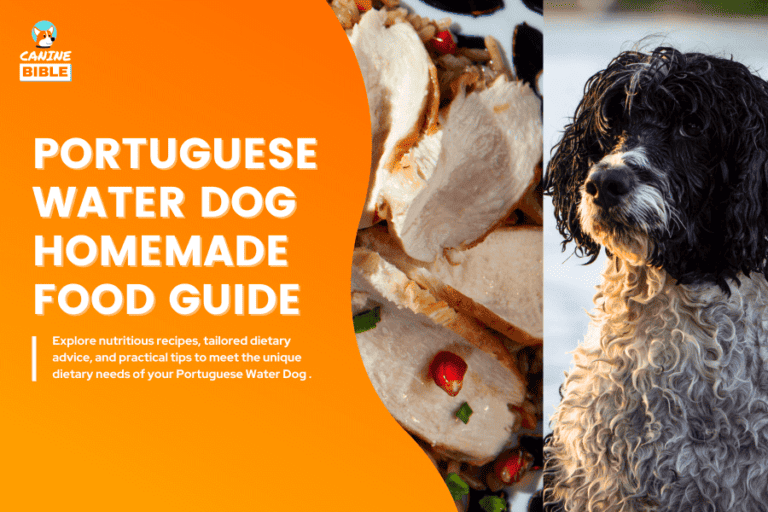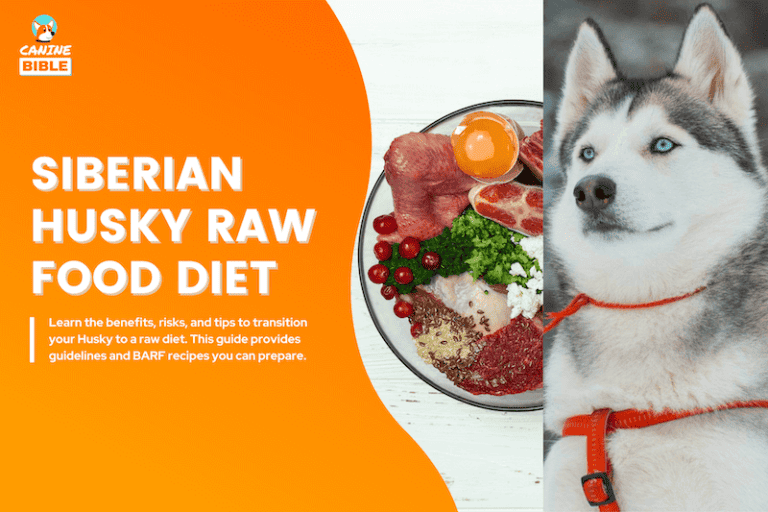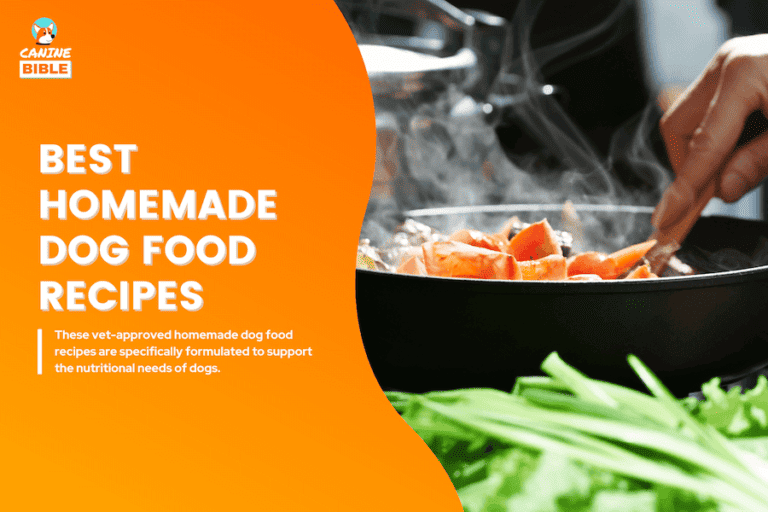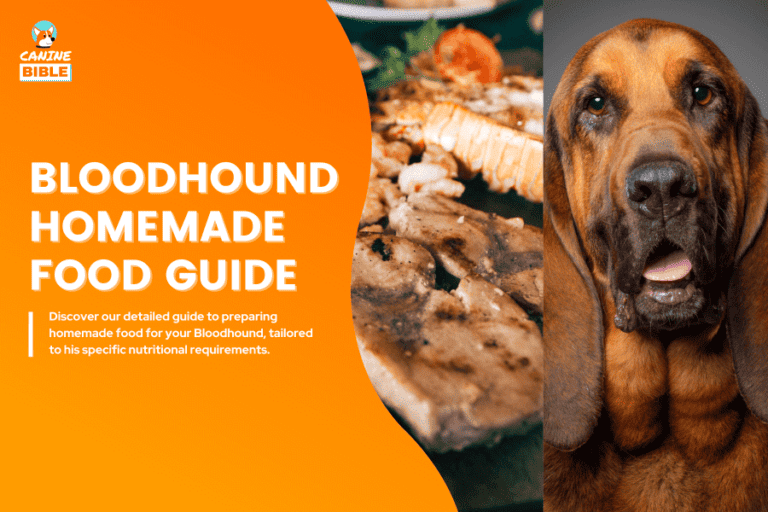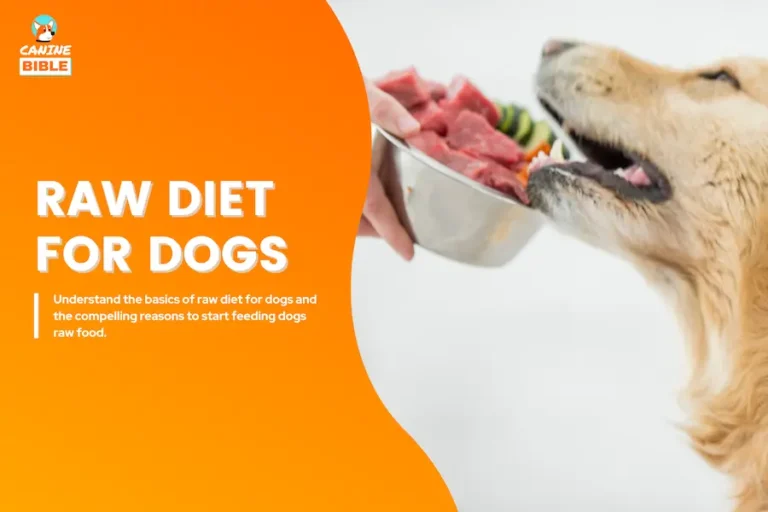Dachshund Homemade Dog Food Recipes: Vet-Approved & Cooking Tips
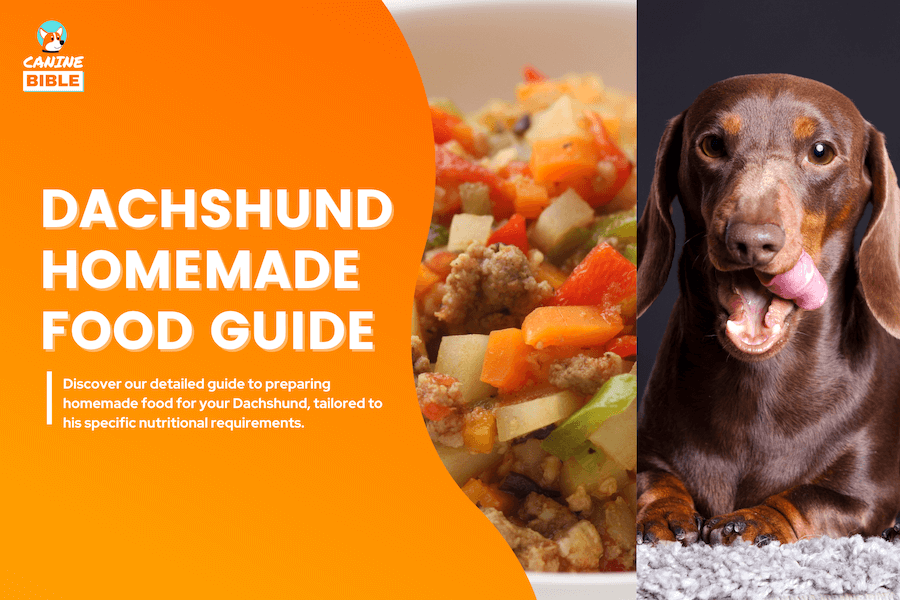
Canine Bible is reader-supported. We receive affiliate commissions via some of our links. This doesn’t affect rankings. Learn more.
This is the most comprehensive guide on Dachshund homemade dog food. Each dog breed has specific nutritional needs, including Dachshunds. Cooking for your Weiner dog is not as simple as throwing out your commercial pet food and replacing it with steak and veggies. A home-cooked meal must be nutritionally balanced and tailored to your dog’s needs. Today, we teach you the basics of how to make homemade food for Dachshunds, including the risks, benefits, breed-specific nutritional advice, and favorite recipes for Dachshunds. Let’s dive right in!

Nutrition, Benefits & Risks
Jump to: Recipes & Cooking
Dachshund Homemade Dog Food Benefits
Here are some of the main benefits of cooking for your Dachshund.
Board-certified veterinary nutritionists and diplomates of the American College of Veterinary Nutrition, Jennifer A. Larsen, DVM, MS, Ph.D., and Joe Bartges, DVM, Ph.D., state that feeding homemade dog food comes with significant advantages, such as diet management, appeasing picky eaters, bond-building, combatting food intolerance and allergies issues, and avoid concern over dog food recalls.[1]
Further benefits include preventing many conditions associated with a poor diet, such as obesity, poor skin, coat condition, pancreatitis, diabetes, and reduced immunity.
Why Feed Homemade Food to Your Dachshund
Dachshunds generally live between 12 to 16 years. Some of this breed’s most common health problems include back, Cushing, and liver disease. Diseases like allergies, stomach issues, and cancer are common in the breed. This breed’s other minor and less common health problems include obesity and dental issues.[2]
Top Reasons to Consider Homemade Food For Dachshunds
Dachshunds Homemade Dog Food Risks
Research by the University of California Davis, School of Veterinary and two studies published in The journal Preventive Veterinary Medicine and The Journal of Nutritional Science found that most homemade dog food recipes lack key essential nutrients, and other recipes used dangerously high levels of some nutrients.[7];[8],[9]
48%
of homemade dog diets had an imprecise determination of ingredients and quantities
28.3%
didn’t use any recommended vitamins, minerals,
or amino acids.
30.4%
of the pet parents admitted
to purposely change
the recipe.
40%
of owners didn’t measure the proportions of the ingredients well enough.
Key Considerations When Feeding Your Dachshund A Homemade Diet
You can get personalized nutritional advice from a registered vet nutritionist through Vetster anytime, anywhere. You can also chat with an online vet and ask them questions about your dog’s nutritional needs. For further dog nutrition guidance, consult “Home-Prepared Dog & Cat Diets: the Healthful Alternative” by Donald R. Strombeck, DVM, Ph.D., a renowned veterinary expert. This book is the go-to resource for healthy homemade dog nutrition for most pet nutritionists.
How to Make Homemade Food For Dachshunds
Homemade food for Dachshunds must include the six essential nutrients for a dog’s proper growth, body function, and health. These nutrients include proteins, carbohydrates, minerals, vitamins, fats, and water.
Below is a detailed breakdown of each nutrient and its importance.
Dachshunds Nutritional Guidelines to Follow
Proteins
Protein plays a vital role in your dog’s diet, providing essential amino acids necessary for bodily processes, including the creation of blood glucose for energy. Protein also helps build and repair muscles and other body tissues. It’s needed to make new skin cells, grow hair, hormones and enzymes. The proteins in your dog’s diet must have a balanced amino acid profile and are provided in appropriate amounts.
Protein dietary recommendations for Dachshund’s homemade food:
Protein sources for homemade Dachshund food include:
Carbohydrates
Dogs need energy for daily activities like growth, pregnancy, lactation, and exercise. This energy, measured in calories, comes from carbohydrates, proteins, and fats. Omnivorous animals, including dogs, derive some energy from carbohydrates. Carbohydrates supply glucose needed by the brain, nervous system and other critical organs for normal function in dogs.
Energy dietary recommendations for Dachshund’s homemade food based on life stage, weight and activity level.
| Type of Dog | 10 lb | 30 lb | 50 lb | 70 lb | 90 lb |
|---|---|---|---|---|---|
| Puppies | 990 | — | — | — | — |
| Inactive Dachshunds | 296 | 674 | 989 | 1,272 | 1,540 |
| Adult Active Inactive Dachshunds | 404 | 922 | 1,353 | 1,740 | 2,100 |
| Pregnant Dachshund | 518 | 1,274 | 1,940 | 2,570 | 3,170 |
| Young Active Dachshunds | 436 | 993 | 1,451 | 1,876 | 2,264 |
| Senior Active Dachshunds | 327 | 745 | 1,093 | 1,407 | 1,700 |
Carbohydrate sources for homemade Dachshund food include:
Fats
Fats play a multifaceted role in a dog’s diet. They are a dense energy source, provide essential fatty acids for skin and coat health, enable absorption of fat-soluble vitamins, improve food palatability, offer insulation and organ protection, support reproductive health, are critical for nervous system function, and serve as a reserve for energy storage.
Fat dietary recommendations for Dachshund’s homemade food:
Fat sources for homemade Dachshund food include:
Minerals
Minerals in a dog’s diet are indispensable for bone and dental health, nerve function, enzymatic reactions, fluid balance, oxygen transport, and maintaining the body’s pH level, making them essential for overall health and metabolic processes. Proper mineral balance is crucial and should be carefully managed to avoid deficiencies or excesses.
These 12 minerals are known to be essential nutrients for dogs:
Mineral sources for homemade Dachshund food include:
Vitamins
Vitamins in a dog’s diet are integral for maintaining overall health and bodily functions. They support vision, immune health, aid in energy metabolism, nervous system function, provide antioxidant benefits, reduce inflammation, prevent diseases and ailments and more. Dogs require vitamins, but only in small amounts, and excessive doses of certain vitamins, like vitamin D, can be harmful to them.[10]
These 12 vitamins are known to be essential nutrients for dogs:
Vitamin sources for homemade Dachshund food include:
Vitamins
Water is vital in a dog’s diet for maintaining hydration, supporting body functions such as digestion, nutrient absorption, and waste excretion, lubricating joints, regulating body temperature, ensuring proper organ function, and facilitating metabolic processes. Continuous access to clean water is as crucial as providing nutritious food for overall health and well-being. Generally, Dachshunds should drink 2 to 3 times the amount of their dry food intake daily. However, if water is readily available from various sources, Dachshunds can naturally regulate its water consumption each day.
Source: We compiled the data for the table above by referencing the Association of American Feed Control Officials (AAFCO) guidelines and the Nutrient Requirements of Dogs Report by the National Research Council (NRC). The AAFCO is responsible for setting nutritional value standards for commercial dog food, which are recognized by state, federal, and international feed regulators. The NRC, part of The National Academies of Science, Engineering, and Medicine, publishes authoritative reports. The Food and Drug Administration (FDA) utilizes the information from these reports to regulate and ensure the safety of pet foods.
Health Dietary Changes In Dachshunds
Dachshunds experiencing any of the issues below might benefit from the dietary adjustments outlined in this table.
| Condition | Dietary Needs & Adjustments |
|---|---|
| Coat Color Changes | Increase amino acids which can be found in protein (>75 grams per 1000 calories) |
| Concurrent GI Signs | Avoid foods with tryptamine and histamine such as dairy or fermented vegetables and meats. This includes bacon. Try a simple ingredient food trial. |
| Chronic Itching and Dermatitis | Fortify the diet with vitamin E, vitamin B, Zinc, omega-6 and the omega-3 fatty acids found in fish oil. Add a dog probiotic. Try a simple ingredient food trial. |
| Dull Coat and Scaling | Adjust EPA and DHA levels in the diet. Adding fish oil can promote healthier coats by reducing itchiness and flakiness in the skin due to its omega-3 fatty acid content. |
| Dandruff and Crustiness | Add Zinc and Vitamin A levels |
Recommended Supplements For Dachshunds
Here are the top recommended supplements for Dachshunds based on their main health susceptibility issues.
Dachshund Calorie Requirements
The caloric needs of dogs are based on their weight. An adult Dachshund usually weighs between 16 and 32 pounds, meaning most Dachshunds need between 497 and 832 calories daily. Ensure you follow the 10% rule when feeding treats to your dog. Food would equal 90% of the total calories and treats the remaining 10%. For instance, if a Dachshund weighs 20 lbs., he would need 587 calories daily. For those eating treats, that’s 528 calories in food (90%) and 59 in treats (10%). Usually, most full-grown dogs eat two meals per day. So, you must split two into two meals of 293 calories each.
Pregnant or lactating Dachshund may need up to 2 to 4 times the food they usually need as the mother’s energy requirements increase after delivery and during lactation. Be sure to talk to your vet. You can use our dog calorie calculator to find the exact caloric needs of your dog based on his weight.
Homemade Dog Food For Dachshund Puppies
A Dachshund puppy’s dietary requirements differ from an adult’s Dachshund. Compared to adult dogs, puppies require higher protein, fat, calcium, and phosphorus levels. Inadequate or excessive amounts of these nutrients can lead to deficiencies, hindered growth, or lifelong health complications.
Dachshund puppies also need the six essential nutrients stated earlier in the following amounts.
Protein: 22.5% dry matter
Carbohydrates: 990 kcal
Fats: 8.5% dry matter
Mineral & vitamins: Refer table above
Water: Plenty
Homemade Dog Food Delivery Service
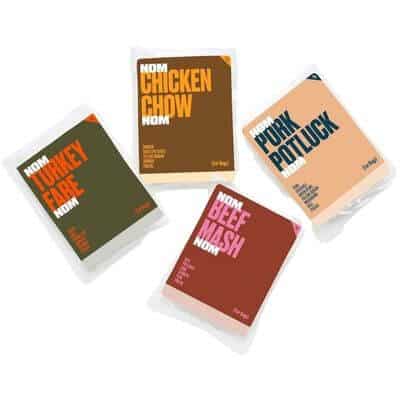
Nom Nom
Who It’s For: The perfect homemade dog food alternative if you don’t have time to cook for your Dachshund or are unable to balance nutrients to provide a balanced diet.
Nom Nom dog food is one of our homemade dog food delivery options. They offer various fresh, homemade dog food options tailored to your dog’s unique dietary needs, age, health conditions, and nutritional goals. For example, if your Dachshund suffers from food-related health issues such as allergies or illnesses, Nom Nom Dog Food can create a customized recipe that caters to those needs. Their meals are made with real, human-grade ingredients and delivered to your doorstep.
The food is developed by veterinary nutritionists who adhere to AAFCO nutritional guidelines. In our experience, using Nom Nom Dog Foods saves you time, allowing you to focus on more important things like walks or training your dog. Additionally, you won’t have to worry about the hassle of meal planning, grocery shopping, or cooking, and you can mitigate the risks of cooking for dogs.
Best Homemade Food For Dachshund
The best homemade food for Dachshund is a balanced diet that provides optimal nutrients for proper function while considering your dog’s nutritional goals and health. We highly recommend Nom Nom and Ollie as the best homemade food for Dachshunds, adults and puppies. Don’t feel like cooking for your Dachshund? Here is the most comprehensive guide to help you find the best dog food for Dachshunds.
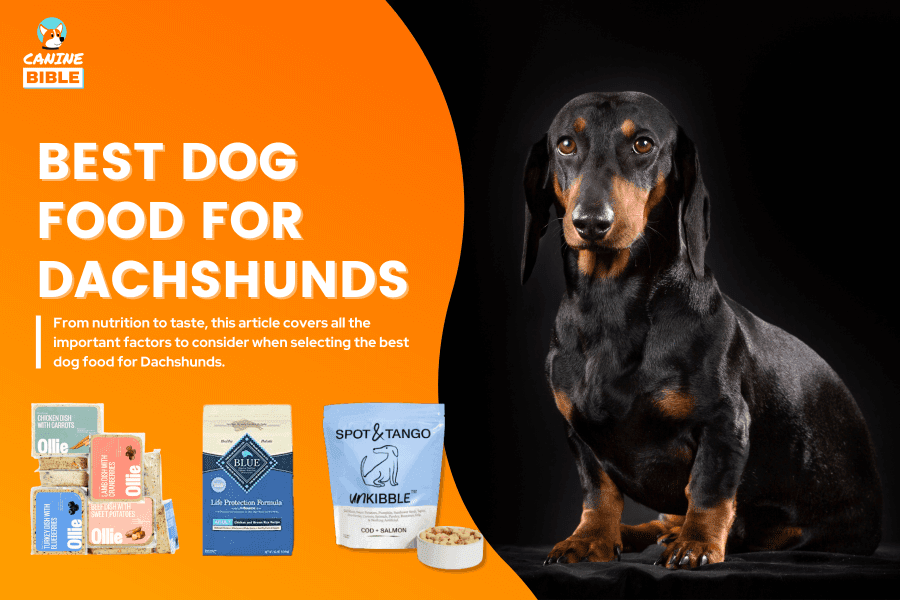
Recipes, Cooking Tips & More
Jump to: Benefits & Nutrition
Dachshund Homemade Food Tips
Before sharing our favorite Dachshund homemade food recipes, follow these best practices when preparing your dog’s next meal.
How To Cook Homemade Food For Dachshunds ( Video)
Watch this video and learn how to cook homemade meals for Dachshunds.
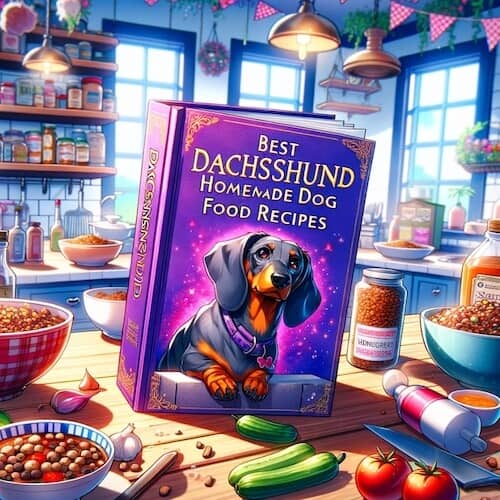
Best Dachshund Homemade Dog Food Recipes
Browse the best homemade dog food recipes for Dachshunds that will make your pup beg for more. We’ve also included a special treat recipe for your Dachshund, enriched with the health benefits of our favorite ingredient: dog CBD oil. CBD oil might help with issues like seizures, anxiety, arthritis, inflammation, pain, and overall wellness.
Note: Consult your vet before adjusting your dog’s diet. The recipes below don’t specify serving sizes since they depend on your dog’s breed, weight, age, activity, and health. As a guideline, consider feeding the equivalent amount you’d give in kibble, but always consult your veterinarian for proper portioning.
If you want more homemade dog food recipes and cooking options for your Dachshund, check out our article on the best vet approved homemade dog food recipes. Cookbooks can be useful for various recipes. Our favorite book for Dachshund homemade food recipes is Home Cooking for Your Dog: 75 Holistic Recipes for a Healthier Dog.
Monitor Weight And Health
A dog’s weight and gut health are essential indicators of their health, and you need to track them when switching to a new diet (i.e., homemade). Maintaining a healthy weight is easier when your Dachshund is fed the right dog food. If your dog’s weight increases or decreases rapidly, it might be due to food-related health issues. A healthy gut can confirm a smooth transition to your dog’s new diet, among other health issues. However, identifying a healthy gut is not an easy task. Fortunately, an at-home dog gut health test can provide insight into your dog’s gut health.
Skin or coat issues, excessive tiredness, allergies, weight loss, malnutrition, and obesity can be caused by unbalanced and insufficient meal plans. If you detect any of these symptoms while feeding your dog meals, stop doing it immediately and seek expert advice.
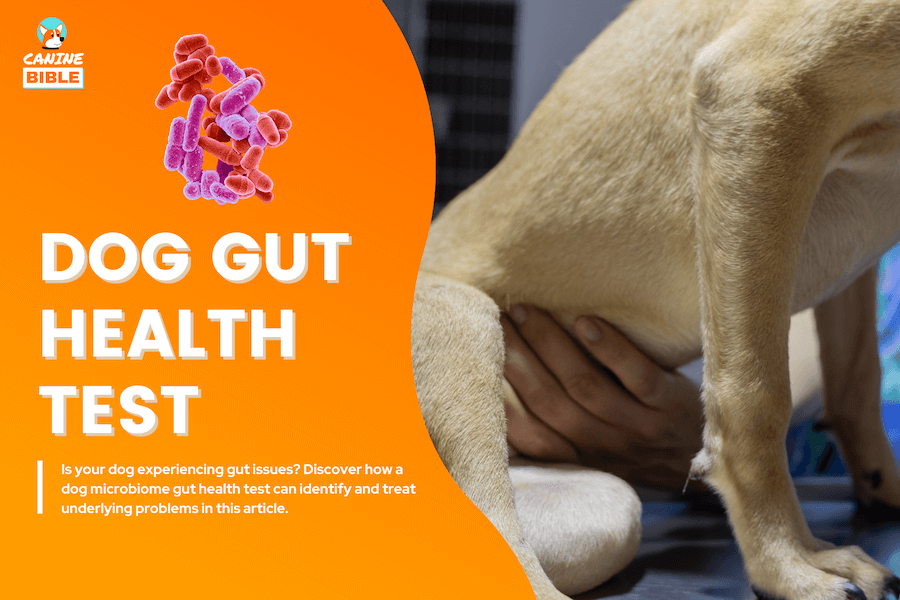
Foods Should Your Dachshund Never Eat
Below is a list of the most common toxic ingredients dogs need to avoid.
Here is the complete list of toxic ingredients your Dachshund should never eat. Please print it out and put it on your refrigerator as a reminder.
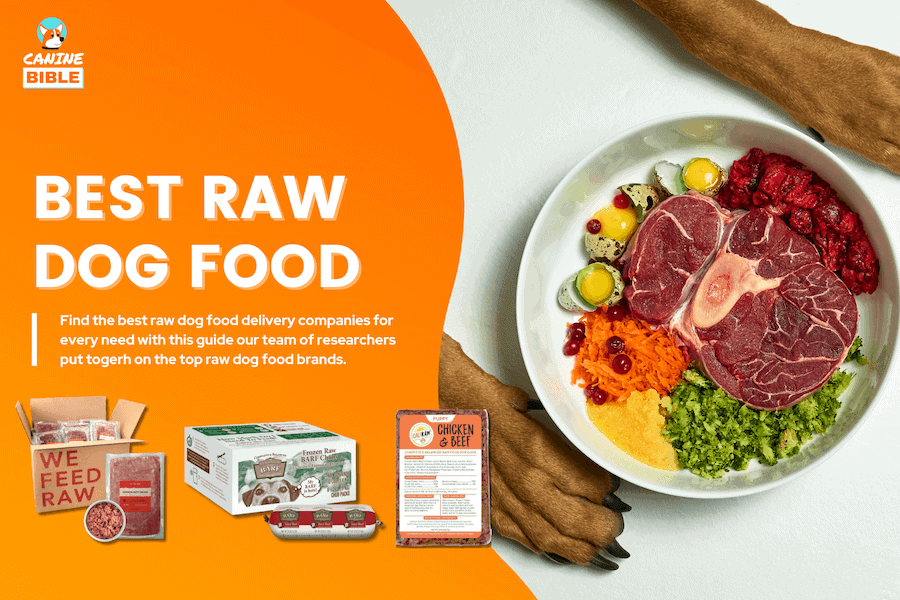
Dachshund Raw Diet (BARF)
Raw dog food mimics dogs’ diet in the wild millions of years ago. Raw dog foods, organs, muscles, whole or ground bones, fresh fruits, vegetables, and dairy products are usually included. Several raw dog foods are available, including homemade raw dog food and store-bought (frozen, freeze-dried, and dehydrated).
As the risk of contamination and nutritional imbalance is higher when handling raw foods, preparing a BARF diet for your Dachshund requires a lot of extra care and planning. Raw dog diets are gaining popularity because of their fantastic health benefits for teeth, coats, digestion, and allergies. Read our raw dog food diet article to learn more about the benefits and risks and get the best raw food diet for your Dachshund.
Homemade Dog Food For Dachshunds — Conclusion & Alternatives
The best dog food for miniature or standard Dachshunds is freshly cooked home meals. We highly recommend it over Kibble. It’s healthier, more nutritious, and can help prevent several health conditions in this breed. It’s essential to ensure you provide your Dachshund with food to help minimize health problems and deliver the nutrition your pup deserves. Read up on vegan dog food if your Dachshund is prone to food allergies or food-related health issues. Plant-based diets are also becoming increasingly popular for dogs with food sensitivities and other health issues.
Like It? Subscribe & Share!
Sources
Canine Bible uses only high-quality sources, including peer-reviewed studies, to support the facts within our articles. Read our editorial process and product review methodology to learn more about how we fact-check, test products, and keep our content accurate, reliable, and trustworthy.
[1] AKC, [2] Purina, [3] Lippert & Sapy [4] AVMA [5] Lyka, [6] Hardvard [7] NCBI, [8] PubMed, [9] UC Davis [10] FDA
Canine Bible authorship represents the unified voice of our entire editorial team and our in-house veterinarians rather than a single author. Each article, blog post, and review published under the Canine Bible name undergoes a rigorous review process, involving all team members to guarantee accuracy and up-to-date in accordance with the latest veterinarian research. This collaborative effort is an integral part of our editorial process and aligns with our four pillars of content creation. This approach ensures our content is backed by expert knowledge and factual information, offering our readers reliable, actionable, and trustworthy content.


![Best French Bulldog Raw Food Diet Guide: Recipes [Adult & Puppy]](https://www.caninebible.com/wp-content/uploads/2021/12/french-bulldog-raw-food-diet-768x512.png)
